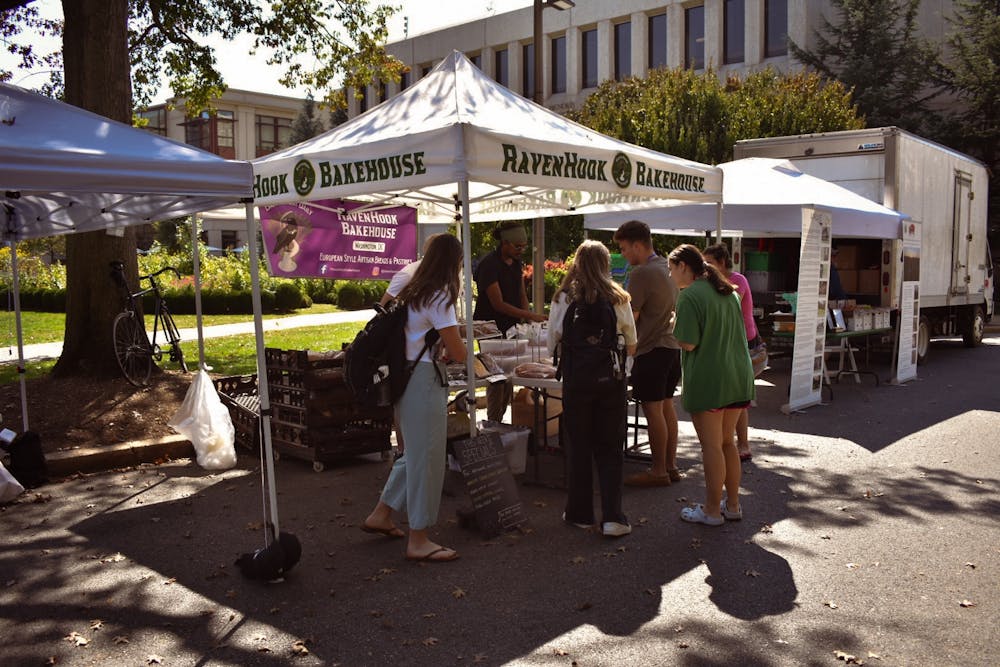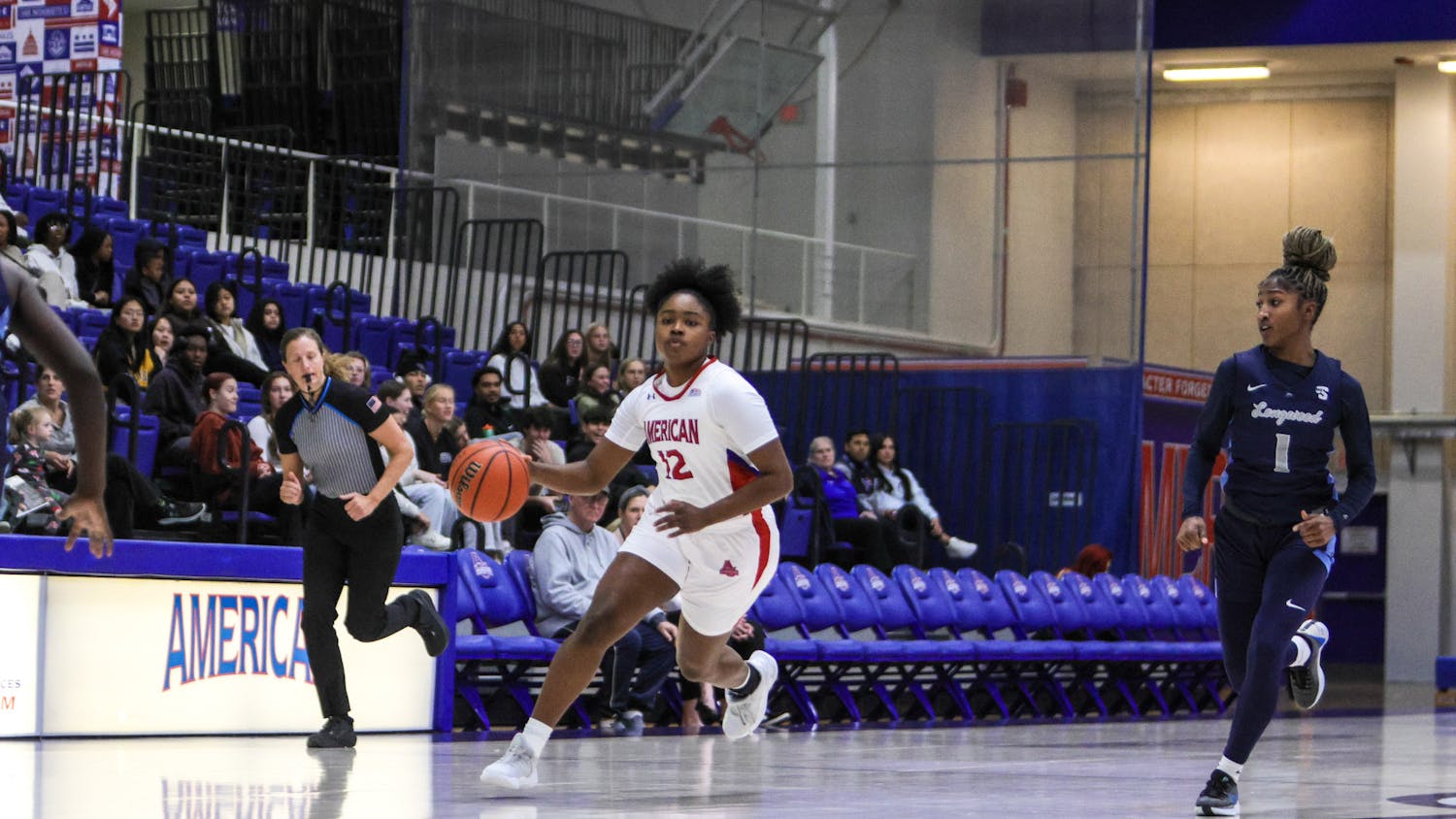Fresh tea, farm-grown ingredients, Ethiopian cuisine and homemade baked goods — all these things can be found at the farmers’ market that takes place from 11 a.m. to 2 p.m. every Wednesday on American University’s quad.
These weekly gatherings give students and local businesses the opportunity to exchange fresh food, drinks and conversations. Students can sample unique offerings from a variety of companies whose ingredients are sourced right here in D.C.
RavenHook Bakehouse
Pastry chef Chris Girardot started RavenHook Bakehouse 18 years ago when he noticed a problem in the District’s bread-making industry: there was none. Girardot said he started RavenHook to fill the lack of fresh, handmade bread and pastries at markets in the D.C. area.
Girardot joined the AU farmers’ market when his friend, a farmer in the area, helped found it in 2009 to help with food insecurity and non-environmentally friendly farming practices in D.C. RavenHook’s locally sourced, all-natural ingredients make for better bread than what is on the market, Girardot said.
“The commercial bakeries use a lot of yeast and bleached flour, and it makes the bread really high and big, but literally that’s like a piece of cardboard,” Girardot said. “We make bread the old fashioned [way], every time, and we use real grains.”
According to Girardot, AU students lean more toward the sweets offered by his bakery. Cookies, muffins and pastries are the most favored items, made with real ingredients as opposed to artificial sugars and dyes.
“I’ve done commercial baking, and it's just horrific how much sugar goes into [baked goods], and that's in replace of actual good ingredients,” Giradot said.
Giardot said RavenHook uses grains farmed by local millers and seasoned from family-owned businesses in the area to ensure that their goods are of the highest quality.
“We take a lot of care and concern with the breads,” Giradot said. “We use a lot of different kinds of local grains, and it is not simple, it takes a lot of time.”
Mesisam the Ethiopian Eatery
Mesisam the Ethiopian Eatery opened in 2018, becoming the first Ethiopian food truck business in the D.C. area. Mesisam offers a variety of vegetarian and non-vegetarian options made with fresh ingredients and spices.
Selam Simret said she opened Mesisam to bring a unique set of flavors and dishes to the D.C. area, as she noticed not many Ethiopian restaurants were populating the area. Simret said the eatery started coming to the AU farmers’ market in fall 2022, and she enjoys talking to students about the ingredients in the variety of food.
“I tell [students] what’s in [the food], and what is gluten-free and dairy-free and I tell them what’s inside,” Simret said.
To cater to a wider audience, Mesisam also allows customers with dietary restrictions to customize their food and its spice level.
Berkshire Farm
AU was gifted the Airlie property — a conference center meant to advance educational environmental programs — in 2016 by the Airlie Foundation. The Berkshire Farm, located on the Airlie property, was introduced as a way for the University to incorporate sustainability efforts into its food sourcing.
Ben Argo, the director of the farm, said the project has helped AU become more conscious of where it's getting its produce from.
“We started with the 22-acre production garden and then we also have another 150 acres where we raised Black Angus Beef and Berkshire Pork,” Argo said. “The farm was a project to help supplement the University with produce as well as meats for the different outlets.”
Argo said he enjoys helping students understand where farm fresh ingredients come from and how they harvest the produce to be brought to students.
“One of the biggest rewards of doing this is the smiles,” Argo said. “Being able to bring fresh produce to people and being a part of producing it as well is definitely satisfying.”
Blum Tea
With locally sourced ingredients, Blum Tea offers several rich and flavorful tea combinations in loose-leaf form as well as fresh honey to compliment each tea flavor.
Employee Janece Steph said Blum Tea has been coming to the AU market for a few months now, and the market has helped the local business gain traction by introducing students to loose-leaf tea.
“[The market] brings a lot of traffic,” Steph said. “A lot of people don't see loose-leaf teas and things like that, so you explain to them what it is and I get to show them all the ingredients in it.”
According to Steph, one of the benefits of opening up Blum Tea to students on campus is not only engaging with tea-loving students but also exposing them to an alternative to the bagged tea many are used to.
“I enjoy just finding out the different kinds of teas that everybody likes and seeing new faces and seeing who's interested in learning about tea because a lot of people are used to bag tea,” Steph said.
Students will have a chance to sample these businesses every Wednesday until Nov. 8.
Correction: A previous version of this article incorrectly stated that AU Kitchen runs the farmer's market. It has been updated to reflect that AHealthyU does.
This article was edited by Maeve Fishel, Jordan Young and Abigail Pritchard. Copy editing done by Isabelle Kravis and Leta Lattin.





